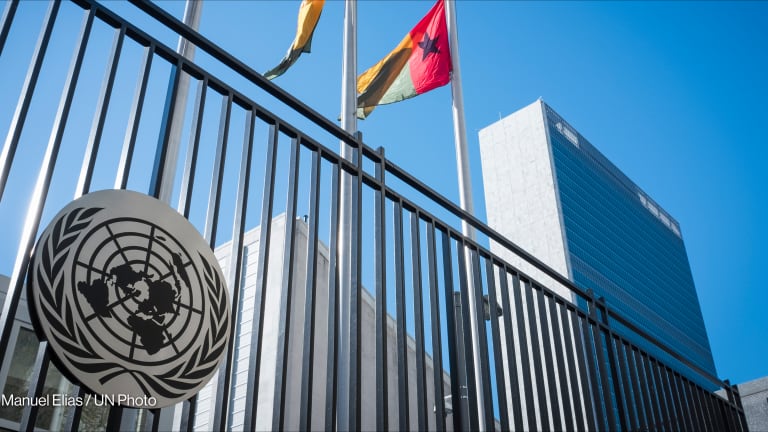
NEW YORK — The 73rd United Nations General Assembly is officially underway, and Global Goals Week is just around the corner.
Once again, politicians, celebrities, civil society leaders, journalists, corporate executives, and philanthropists will descend on New York City for a week that remains unparalleled in the amount of political and financial power it can assemble around the global development community’s highest priorities — and for the amount of traffic congestion it can produce.
Devex will be on the scene throughout the week, breaking down the biggest stories from the United Nations, to Bloomberg’s Global Business Forum, to the World Economic Forum, Concordia’s Annual Summit — and a wide array of side events tackling everything from universal health care to Secretary-General António Guterres’ U.N. reform agenda. And of course Donald Trump.
Here are just a few of the stories we’ll be watching as Global Goals Week kicks off:
Can Bill Gates lead a human capital revolution?
Several events during Global Goals Week aim to build on the momentum of growing awareness that human capital — the health, education, and skills of a population — is an important determinant of a country’s success.
Bill and Melinda Gates on the 'single biggest determinant' of progress on the SDGs
On Sept. 18, Gates Foundation released their second annual Goalkeepers report, calling for a "third wave" of poverty reduction focused on Africa's booming youth population.
Perhaps the highest profile example of this is the event co-hosted by Bill and Melinda Gates, which launched last year as part of a range of efforts to fill the void left by the Clinton Global Initiative, and will take place annually until 2030, the target date for achieving the Sustainable Development Goals.
Earlier this week, the Bill & Melinda Gates Foundation released a report where the co-chairs identified rapid population growth, particularly in Africa, as the greatest threat to progress in reducing global poverty. The Gates Foundation explains in the report how investments in human capital — in areas such as health, education, and agriculture — can turn the youth bulge from a challenge into an opportunity.
On Tuesday evening, the Gates Foundation will honor individuals it has identified as accelerating the path to achieving the SDGs at an awards dinner. Then on Wednesday, the annual Goalkeepers event will highlight examples of what is possible when it comes to investing in youth. The Gates Foundation is working on a data-driven, solutions focused, and action-oriented agenda, in a model its team describes as highlighting the progress that has been achieved, holding governments accountable, and convening a new generation of leaders to achieve the SDGs.
Will Wall Street come to Turtle Bay?
While the past several years have given rise to an increasing number of private sector-oriented events and private sector voices around UNGA, this may be the year to watch the finance industry.
With their customers demanding it, more and more banks are beginning to offer impact investing opportunities, or socially-conscious investments of some sort. But there are questions about how much investment is actually making it to critical areas, how to raise the right types of funds around key issues, and how to measure the impact. There will likely be conversations about all of those issues, and more, including innovative finance options for education, and new ways to finance humanitarian aid.
While a recurring group of CEOs will likely be making the rounds, it will be interesting to see if there are new faces and how companies are integrating the SDGs, or development objectives, into their strategies and operations.
Real progress, or empty promises on the SDGs?
This year UNGA marks 1000 days into the SDGs, and there are many events tying any number of issues to those global goals. One of the things to watch, is how behaviors have changed, and strategies altered around the SDGs. Are the goals proving to be a useful framework? Are they more of a communications tool? With some targets backsliding — think out-of-school girls, and food security — what does it mean for the success of the goals and what needs to be done?
Devex will be exploring the issue of SDGs throughout the week. While the response to the goals may vary, one thing most leaders Devex spoke with agree on, is that they provide a common lexicon and starting point for conversations.
With climate change exacerbating migration and food insecurity, and as conflict further fans the flames, in some ways, the world seems further behind where it was three years ago when the SDGs were ushered in amidst high hopes that the ambitious — and some say overly broad and complex — goals would help the world end extreme poverty. Conflicts in South Sudan, Yemen, and the government stranglehold in Venezuela, point to places where progress has not been made.
When the U.N. released its official report on SDG progress this summer, it was clear that the world is not on track to achieve the goals. And U.N. chief Guterres said at the time that “we must inject a sense of urgency” into work toward the goals. This will be a week to watch if that call can begin to translate into action.
Will underfunded diseases get an UNGA boost?
Several lurking global health crises are taking center stage at this year's General Assembly. We will be closely following the two high-level meetings next week that will center on tuberculosis and noncommunicable diseases — and the commitment to making good on the health SDG that aims to end TB to dramatically reduce NCDs by 2030. Universal health coverage is another area, overlapping with these two issues, that will gain prominence through a series of side events, in the lead-up to a scheduled high-level meeting in 2019.
Devex content series: Taking the Pulse
► The divisive issue stalling both NCD, TB negotiations
► Ahead of UNGA, over 50 health experts sign letter for action on NCDs
► Tuberculosis and NCDs jostle for space in global health agenda
It's the third high-level U.N. meeting on NCDs — meaning transmittable diseases, such as heart attack, stroke, and cancer. NCDs do not immediately stand out as visible health crises, as Ebola does. But, collectively, they are major killers, responsible for more than 70 percent of all global deaths. Watch for government commitments to take on obesity prevention, smoking, and other quality of life issues.
Meanwhile, the first-ever high-level meeting on TB will fall on Wednesday, just behind the NCDs meeting. The TB meeting has been a long time in the making, experts tell Devex. TB has been around for hundreds of years, and is a top 10 killer worldwide, though it's mostly concentrated in low- and middle-income countries. While the incidence of TB is falling, the rate isn't yet fast enough to meet SDG 3, and increasingly, multidrug resistant strains of TB are posing new problems for patients worldwide.
Next week, we'll be watching how the TB civil society movement is taking off, including the government agreements to help patients more easily access necessary drugs.
What will Donald Trump do?
Last year, in his first speech to UNGA, U.S. President Donald Trump dropped some memorable lines that left little doubt about his willingness to defy diplomatic restraint. He referred to North Korean leader Kim Jong-un as “Rocket Man,” he spoke about the Iranian government’s “pursuit of death and destruction,” and he launched a throwback condemnation of socialism and communism. It was a speech regarded by many as unlike any ever before delivered by a U.S. president in the U.N. chamber.
At the same time, Trump’s speech seemed to present some unexpected olive branches that raised hopes his administration might maintain U.S. support for efforts to improve global health — and Secretary-General Guterres’ efforts to improve the U.N. Trump highlighted the U.S. President’s Emergency Plan for AIDS Relief, the President’s Malaria Initiative, the Global Health Security Agenda, the Global Fund to End Modern Slavery, and the Women Entrepreneurs Finance Initiative, which his daughter, Ivanka, has supported.
If Trump’s 2017 performance was intended to cause a stir, it was successful. It also ensured that one of the biggest questions on the global development community’s collective mind leading into this Global Goals Week is: What will Trump do — or say — this time?
In the past year, the White House has cut off funding for the U.N. Relief and Works Agency for Palestine Refugees in the Middle East, drawing criticism from Palestinians, NGO leaders, and U.N. officials. Under Trump, the U.S. has vacated its seat on the U.N. Human Rights Council, with U.S. Ambassador to the U.N. Nikki Haley referring to it as a “cesspool of political bias.” The past year has also seen skeptics of multilateral cooperation ascendent inside Trump’s foreign policy team. In April, John Bolton, a fierce U.N. critic, replaced the more moderate H.R. McMaster as Trump’s national security advisor.
On Monday, Secretary of State Mike Pompeo announced that the U.S. will cut the number of refugees it admits into the country to 30,000 in the upcoming fiscal year, down from the already reduced 45,000.
The administration has not shied away from policy initiatives that put the U.S. at odds with large segments of the U.N.’s global body. The development community will be watching to see whether Trump’s White House rejects their priorities too, or if it highlights some aspects of development cooperation as a rare point of agreement.
NCDs. Climate change. Financing. Read more of Devex's coverage from the 73rd U.N. General Assembly here.











